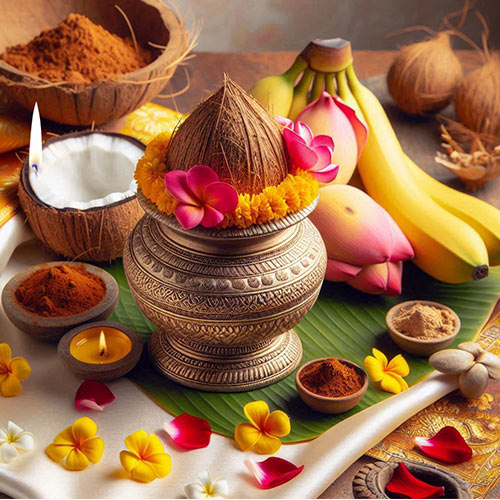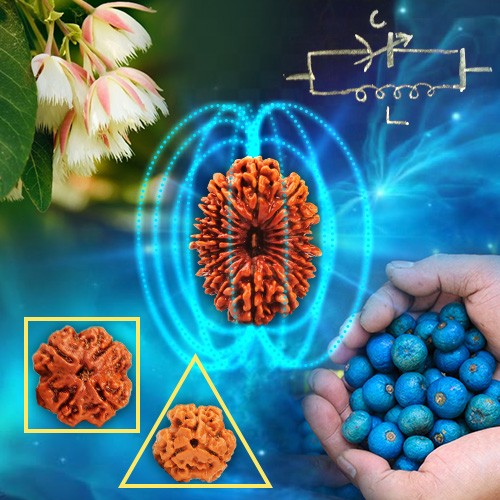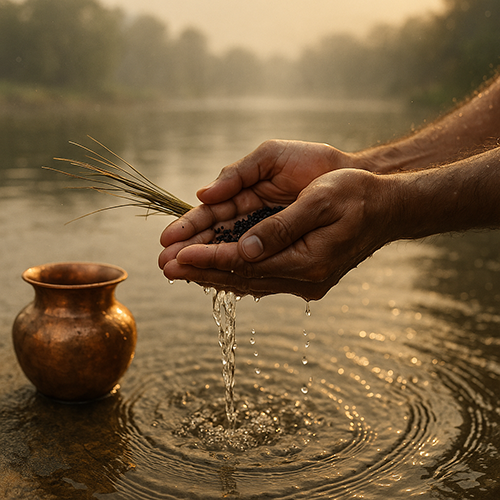Copper and brass have long been cherished in Vedic rituals for their power to conduct pranic energy and hold sacred vibrations. Whether shaping the form of a deity, forming the bowl of a puja vessel, or creating the base of a glowing diya, these radiant metals are far more than just functional, they are divine instruments. Yet, with regular exposure to air, water, oils, and ritual offerings, their natural brilliance can fade, and their surface may become tarnished.
Cleaning such sacred items is therefore not merely a task of maintenance but an act of reverence, a way of preserving both form and sanctity. This blog will serve as a practical guide to Cleaning Brass & Copper Idols, Jewelry & Puja Vessels.
Why Do Copper and Brass Items Tarnish?
Copper and brass, while known for their aesthetic appeal and durability, are susceptible to tarnishing over time due to oxidation. This process occurs when these metals react with various elements in their environment.
The primary factors leading to the tarnishing of copper and brass include:
- Exposure to Air and Moisture: When copper and brass are exposed to air and moisture, they undergo oxidation, which results in the formation of a characteristic greenish or dark patina. This patina, while sometimes valued for its antique appearance, is a sign of corrosion.
- Contact with Acidic Substances: Acidic substances such as tamarind, lime, sweat, and food can accelerate the tarnishing process. These acids break down the metal’s surface, causing discoloration and a buildup of corrosion. Items used in rituals involving such substances are particularly prone to tarnishing.
- Pollutants and Chemicals: Pollutants in the air, as well as chemicals found in soaps, cleaning agents, or other household products, can also contribute to tarnishing. These chemicals interact with the metal, causing it to deteriorate and lose its lustrous appearance.
Unlike silver, which tarnishes at a slower pace, copper and brass are more reactive to these factors. Tarnishing is often faster and more noticeable in humid environments or with frequent exposure to ritual substances like milk, honey, or ghee. As a result, these metals require regular care and maintenance to preserve their beauty and prevent excessive tarnish buildup.
How to Clean Copper & Brass Idols, Jewelry & Puja Vessels
Copper and brass idols, jewelry, and puja vessels are sacred representations and require special care and reverence. Proper cleaning and maintenance ensure that these items remain spiritually charged and pristine, retaining both their physical beauty and energetic properties.
Pitambari
Pitambari is a popular metal cleaning powder used in Indian households to clean brass, copper, and sometimes silver items. It is made from a blend of natural acids, surfactants, and polishing agents that remove tarnish, oxidation, and grime without damaging the metal. Unlike harsh chemical cleaners, Pitambari is considered gentle and safe for puja utensils, idols, and decorative metalware.
Steps:
- Wet the Copper/Brass Item
- Apply Pitambari Powder on Wet Cloth, Sponge or Brush
- Scrub on the Tarnished Areas in Circular Motion
- Once cleaned use running water to remove all residue
- Wipe it dry with cloth
Pitambari can be slightly abrasive, so it should not be used on items with gold plating, other metal platings, enameling, or those studded with gemstones.
Lemon and Salt Method (Traditional & Effective)
Best for: Routine cleaning, removing light to moderate tarnish.
Steps:
• Cut a fresh lemon in half.
• Dip it in rock salt.
• Rub gently over the surface, covering grooves and carvings.
• Let it sit for 5 minutes.
• Rinse thoroughly with warm water.
• Wipe dry with a cotton cloth.
This method restores brightness while preserving the sacredness of the idol or object.
Tamarind Paste Method (Age-old Temple Technique)
Best for: Deep cleansing of heavily oxidized idols or vessels.
Steps:
- Soak a ball of tamarind pulp in warm water.
- Rub it onto the brass or copper surface using fingers or a soft cloth.
- Scrub gently.
- Rinse well and dry thoroughly.
Tamarind naturally removes dullness without damaging the metal, making it ideal for more delicate pieces.
Herbal Polish for Brass and Copper
Best for: Quick shine and safe usage before puja.
Herbal polishes are chemical-free and non-toxic, perfect for spiritually significant objects. They cleanse and energize items without stripping the spiritual imprint they carry.
Buy Herbal Polish Cleaner at Rudra Centre
Natural Cleaning with Flour + Vinegar + Salt Paste
Best for: Gently lifting tarnish and preserving fine detailing in jewelry.
Steps:
- Mix 1 tablespoon flour, 1 tablespoon salt, and 1 tablespoon white vinegar into a paste.
- Apply the paste onto the jewelry and let it sit for 10 minutes.
- Rinse with warm water.
- Buff with a microfiber cloth.
This method ensures that the detailing of the jewelry remains intact while removing tarnish gently.
Do Not Use Abrasive Commercial Cleaners
Avoid using abrasive cleaners as they can damage engravings and remove the natural polish of copper and brass jewelry. Always opt for soft cloths and natural cleaning agents to maintain the integrity of the metal.
Post-Ritual Cleaning for Puja Vessels (Daily)
- Rinse immediately after use.
- Use lemon water or mild soap for cleaning.
- Dry with a clean cloth to avoid water spots.
This ensures that your puja vessels remain clean and free from any impurities after every ritual.
Weekly Purification (Spiritual & Physical)
• Apply herbal polish or natural paste for a deeper cleanse.
• Chant mantras or sprinkle Ganga Jal while cleaning to spiritually energize the vessel.
This ritual purifies and energizes the vessel, preparing it for the next ritual.
Preventing Tarnish in Copper and Brass Items
Over time, exposure to moisture, chemicals, and improper storage can cause these metals to lose their luster. To ensure that your copper and brass items remain gleaming and in good condition, follow these simple yet effective steps for proper maintenance:
- Store in dry places; use silica gel to absorb humidity.
- Keep wrapped in cotton cloths.
- Avoid contact with soap residue, water, or chemicals.
- Do not store food or milk in these vessels for long durations.
- Polish gently after each puja using a dry silver/brass cloth.
When to Avoid Cleaning
Some antique idols and heirloom vessels have a deliberate oxidized finish known as patina, which should not be removed as it is considered auspicious.
In such cases:
- Gently dust with a soft dry cloth.
- Avoid acidic or abrasive methods.
- Use only Ganga Jal or pure water for ritual cleaning.
Cleaning copper and brass items is not merely a chore, it is a sacred ritual in itself. Just as you sanctify your altar space with devotion and intent, your sacred metals, too, deserve the same reverence. These items are not just ornamental objects; they are carriers of divine energy, conduits through which spiritual vibrations flow during every puja and offering.
When you maintain them with love and regular care, you are not only preserving their outer brilliance but also honoring the spiritual essence they hold. This mindful upkeep deepens your connection with the divine, elevates the sanctity of your rituals, and invites higher vibrations into your space.
May your idols radiate the glow of purity, may your puja vessels shine with celestial brilliance, and may your entire spiritual environment be illuminated by the vibrant energy of well-cared-for copper and brass. Let every gleam be a reflection of your devotion.


-in-Astrology.jpg)






.jpg)

.png)

Comments 0
Leave your thought here